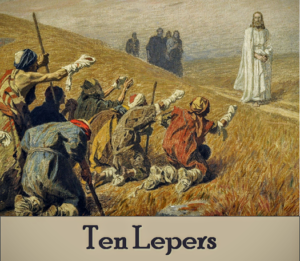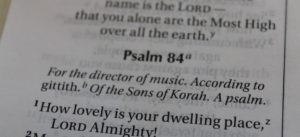READING FROM THE OLD TESTAMENT- JOSHUA 11:1-12:24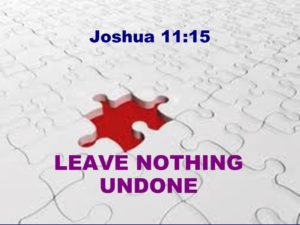
Today’s reading takes us to the end of Joshua’s initial campaign to fulfill the command given by the Lord.
The LORD first said to Moses:
Exodus 33:2-3 2 “I will send an angel before you and I will drive out the Canaanite, the Amorite, the Hittite, the Perizzite, the Hivite and the Jebusite. (See Exodus 23:22-32; Deut 7:1-6.
God ordered the destruction of the unrepentant Canaanites because of the corrupting influence of their wicked idolatry and immorality.
Joshua 11:15 15 Just as the LORD had commanded Moses his servant, so Moses commanded Joshua, and so Joshua did; he left nothing undone of all that the LORD had commanded Moses.
The northern kings and their armies united in a confederated attempt to break the power of Joshua and the Israelites.
Once again, Joshua is reminded not to fear. An overwhelming sight, such as an army coming against you as a horde appearing as numerous as the sand on the seashore, could be intimidating! But Joshua is assured that the Lord is Sovereign and will deliver the enemy into his hand.
Joshua 11:6 6 Then the LORD said to Joshua, “Do not be afraid because of them, for tomorrow at this time I will deliver all of them slain before Israel; you shall hamstring their horses and burn their chariots with fire.”
To ‘hock’ or ‘hamstring’ a horse was to cut the sinew muscle in the back legs to make the animal incapable of speed and unfit for military service.
There is some debate on the translation of the Hebrew word, ‘iqqir’, but the majority translate it ‘hamstrung’ rather than ‘to geld’ or ‘castrate’.
Some might ask, “Is the Lord being cruel to animals”?
First, we must start with what we know of God’s self-revelation in Scriptures. He is righteous, just, all-knowing, merciful, and compassionate. He is the creator of all, including animals, and has the right to do what He sees fit with all that He made. We can trust that His knowledge of what is ‘fit’ exceeds our own. He also knows all the circumstances and the ‘what if’ scenarios. We can trust that there was a redemptive purpose in the Lord’s command.
Earlier God had given the command through the law of Moses that they were not to breed horses.
Deuteronomy 17:16 16 “Moreover, he shall not multiply horses for himself, nor shall he cause the people to return to Egypt to multiply horses, since the LORD has said to you, ‘You shall never again return that way.’
In the days of Solomon this command was blatantly violated, for he acquired many horses:
1 Kings 10:26 26 Now Solomon gathered chariots and horsemen; and he had 1,400 chariots and 12,000 horsemen, and he stationed them in the chariot cities and with the king in Jerusalem. (See also 1Kings 9:19)
What was the reason for the original prohibition for the people of the covenant as they entered the promised land?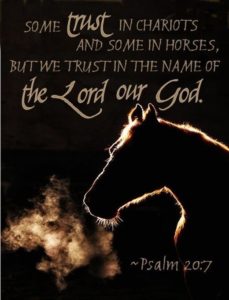
- Acquiring horses in Canaan would involve interaction with pagan neighbors with their idolatries and corrupt practices. Horses were used in pagan pageantry. This was the case when King Josiah reigned in Judah and initiated a purge of idolatry that had corrupted the land through the idolatrous sins of previous kings.
2 Kings 23:11 11 He did away with the horses which the kings of Judah had given to the sun, at the entrance of the house of the LORD, by the chamber of Nathan-melech the official, which was in the precincts; and he burned the chariots of the sun with fire.
- The confidence of the Lord’s people needed to be placed in the Lord and not in their own strength or military equipment.
Psalm 20:7 7 Some boast in chariots and some in horses, but we will boast in the name of the LORD, our God.
After defeating the confederation from the north, Joshua conquers Hazor. He devotes it to destruction as the Lord commanded. Hazor is one of the three cities that are explicitly recorded as being burned in the conquest. (Jericho and Ai were the others- Josh 6:24 and Ai -Josh 8:28).
Throughout the account, we are continuously reminded that it was the Lord who commanded the conquest and delivered the enemy into Joshua’s hand. We also are continually reminded of Joshua’s obedience. 
Divine Sovereignty and Human Responsibility are hand-in-hand themes in the Bible. There are two sides to the divinely designed coin of God’s sovereignty. And the coin remains in God’s hand throughout. One side of the coin emphasizes God’s will of command, His will of desire. The other side emphasizes human responsibility, His will of decree. And there is great blessing when human beings respond to God’s command with the obedience of faith.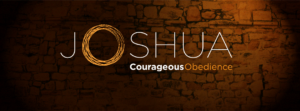
Hebrews 11:6 6 And without faith it is impossible to please Him, for he who comes to God must believe that He is and that He is a rewarder of those who seek Him.
Notice these references to Joshua’s obedience:
Joshua 11:9a 9 Joshua did to them as the LORD had told him.
Joshua 11:12 12 Joshua captured all the cities of these kings…just as Moses the servant of the LORD had commanded.
Joshua 11:15 15 Just as the LORD had commanded Moses his servant, so Moses commanded Joshua, and so Joshua did; he left nothing undone of all that the LORD had commanded Moses.
Joshua 11:20 “just as the Lord commanded Moses”
Joshua 11:23 “So Joshua took the whole land, according to all that the Lord had spoken to Moses.”
The protocol was to offer treaties of peace before attacking the cities.
Deuteronomy 20:10-11 10 “When you approach a city to fight against it, you shall offer it terms of peace. 11 “If it agrees to make peace with you and opens to you, then all the people who are found in it shall become your forced labor and shall serve you.
However, we read:
Joshua 11:19-20 19 There was not a city which made peace with the sons of Israel except the Hivites living in Gibeon; they took them all in battle. 20 For it was of the LORD to harden their hearts, to meet Israel in battle in order that he might utterly destroy them, that they might receive no mercy, but that he might destroy them, just as the LORD had commanded Moses.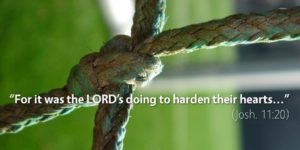
We see that both God’s sovereignty was involved and human responsibility (opportunities for agreement with the Lord’s terms).
Joshua 11:18 18 Joshua waged war a long time with all these kings.
The account of the conquest takes only seven chapters, but it is likely that it took seven years. There would be battles in the future as individual tribes faced enemies when they settled in the land of their inheritance. But the initial conquest is complete. They were now to stand their ground and defend it.
Joshua 11:23 23 So Joshua took the whole land, according to all that the LORD had spoken to Moses, and Joshua gave it for an inheritance to Israel according to their divisions by their tribes. Thus the land had rest from war.
Chapter 12 summarizes the extent of the conquest, first under Moses (12:1-6) and then under Joshua (12:7-24). Thirty-one kings from the West side of Jordan are listed to give us a greater appreciation of the extent of what was accomplished!
The destructive part of the Divine work is potentially accomplished, and now the constructive work of settling the land begins. We will read about that in the second half of the Book of Joshua, beginning tomorrow.
NEW TESTAMENT READING: LUKE 17:11-37
Jesus heals ten lepers as he is on route to Jerusalem and on the border between Galilee and Samaria. They all cry out, “Master, have pity on us”. He tells them to go to the priests (as commanded in Leviticus 14), and they are cleansed from leprosy as they go. The irony is that only one leper comes back to Jesus after showing himself to the priest, and that leper is a Samaritan (Luke 17:16), one despised by the Galilean Jews as being religiously inferior. He is praising God and throws himself at Jesus’ feet.
Luke 17:17-19 17 Then Jesus answered and said, “Were there not ten cleansed? But the nine—where are they? 18 Was no one found who returned to give glory to God, except this foreigner?” 19 And He said to him, “Stand up and go; your faith has made you well.”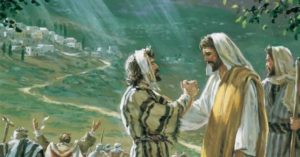
All ten lepers were healed, but only one was made well! This was evident in the fact that the cleansed leper came to give glory and worship to God. (He fell prostrate before Jesus). May we also demonstrate that He has made us well by giving Him His due worship, thanksgiving, and praise.
“The kingdom of God does not come with your careful observation…” (Luke 17:20)
Jesus reminds us that while we live in anticipation looking for the establishment of the kingdom of God on the earth, we should not be gullible, over-anxious, or be given to the fantasy that the kingdom is fully realized now. There is a real danger that His people can be misled in this area, adopting a false triumphalism or an over-realized eschatology. There is an aspect to the kingdom rule of God that we can experience as in Christ ones, filled with the Spirit. But that experience is all “in Christ’. We see the rule of God perfectly manifested in Him. And we will recognize His kingdom rule in the lives of believers who are manifesting the fruit of Christ’s indwelling presence (Luke 17:21) outwardly.
There is also no manifestation of the kingdom on the ground of the old creation ‘in Adam’. All must go to the cross. The kingdom will be manifested on the resurrection ground of a new creation in Christ.
Jesus warns of non-stop earthly preoccupations. Those in Noah’s day carried on with their earthly lives and gave no thought to the gospel that Noah preached.
Jesus gives a ‘fast forward’ view to His coming at the end of the age to reign as King. He is coming as Judge. People need to be in a right relationship with God if He is to reign among them.
Jesus gives His hearers a view of the great tribulation that is to come in the Day of the Lord. What He describes in one sentence is spelled out more fully in the last book in the New Testament, the apostle John’s “The Revelation of Jesus Christ.
The Coming of the Son of Man will not be something done in a corner but plain for all to see. Jesus speaks of this in His discourse with His disciples on the Mount of Olives before His crucifixion.
Matthew 24:27-28 27 “For just as the lightning comes from the east and flashes even to the west, so will the coming of the Son of Man be. 28 “Wherever the corpse is, there the vultures will gather.
Luke speaks of this earlier in Chapter 17, indicating that on numerous occasions, Jesus spoke of His second coming at the end of the age.
The gathering of the vultures anticipates the coming judgment of God’s wrath upon those who reject His righteous rule.
Luke 17:37 “Where the body is, there also the vultures will be gathered.”
This image is clarified in the Book of Revelation.
Revelation 8:13 13 Then I looked, and I heard an eagle (aetos- translated elsewhere in the New Testament as ‘vulture’) flying in midheaven, saying with a loud voice, “Woe, woe, woe to those who dwell on the earth, because of the remaining blasts of the trumpet of the three angels who are about to sound!”
At the return of Christ:
Revelation 19:17-18 17 Then I saw an angel standing in the sun, and he cried out with a loud voice, saying to all the birds which fly in midheaven, “Come, assemble for the great supper of God, 18 so that you may eat the flesh of kings and the flesh of commanders and the flesh of mighty men and the flesh of horses and of those who sit on them and the flesh of all men, both free men and slaves, and small and great.”
Psalm 84:1-3 1
How lovely are Your dwelling places, O LORD of hosts! 2 My soul longed and even yearned for the courts of the LORD; My heart and my flesh sing for joy to the living God.
This is the song of a Levite, a son of Korah who had the privilege of serving in the courts of the Lord. There is no self-pity. There is no expression of dissatisfaction with their lot, although the Levites received no possession of land in Israel.
This Psalm radiates the affection that the Levites had for the courts of the Lord and should reflect our affection for the blessing of fellowship with the Living God.
1 Corinthians 1:9 9 God is faithful, through whom you were called into fellowship with His Son, Jesus Christ our Lord.
Psalm 84:10 10 For a day in Your courts is better than a thousand outside. I would rather stand at the threshold of the house of my God Than dwell in the tents of wickedness.
The Psalm concludes with an enduring promise:
Psalm 84:11-12 11 For the LORD God is a sun and shield; The LORD gives grace and glory; No good thing does He withhold from those who walk uprightly. 12 O LORD of hosts, How blessed is the man who trusts in You!
PROVERB FOR TODAY– Hate falsehood. Keep the example of Christ – the Lord our Righteousness- to guard your pathway.
Proverbs 13:5-6 5 A righteous man hates falsehood, but a wicked man acts disgustingly and shamefully. 6 Righteousness guards the one whose way is blameless, but wickedness subverts the sinner.
PRAYER: Lord, we thank You for delivering us from darkness to light, from death to life, from the kingdom of self to the Kingdom of Your Son. We realize that you have called us to battle those forces that war against our soul. Help us to defeat the enemies that would ensnare us. We want our souls to be fully occupied by You, giving no ground to the enemy. Lead us in this battle, Lord God of hosts. In Jesus Name. Amen.
Pastor David K MacAdam
New Life Community Church, Concord, MA

